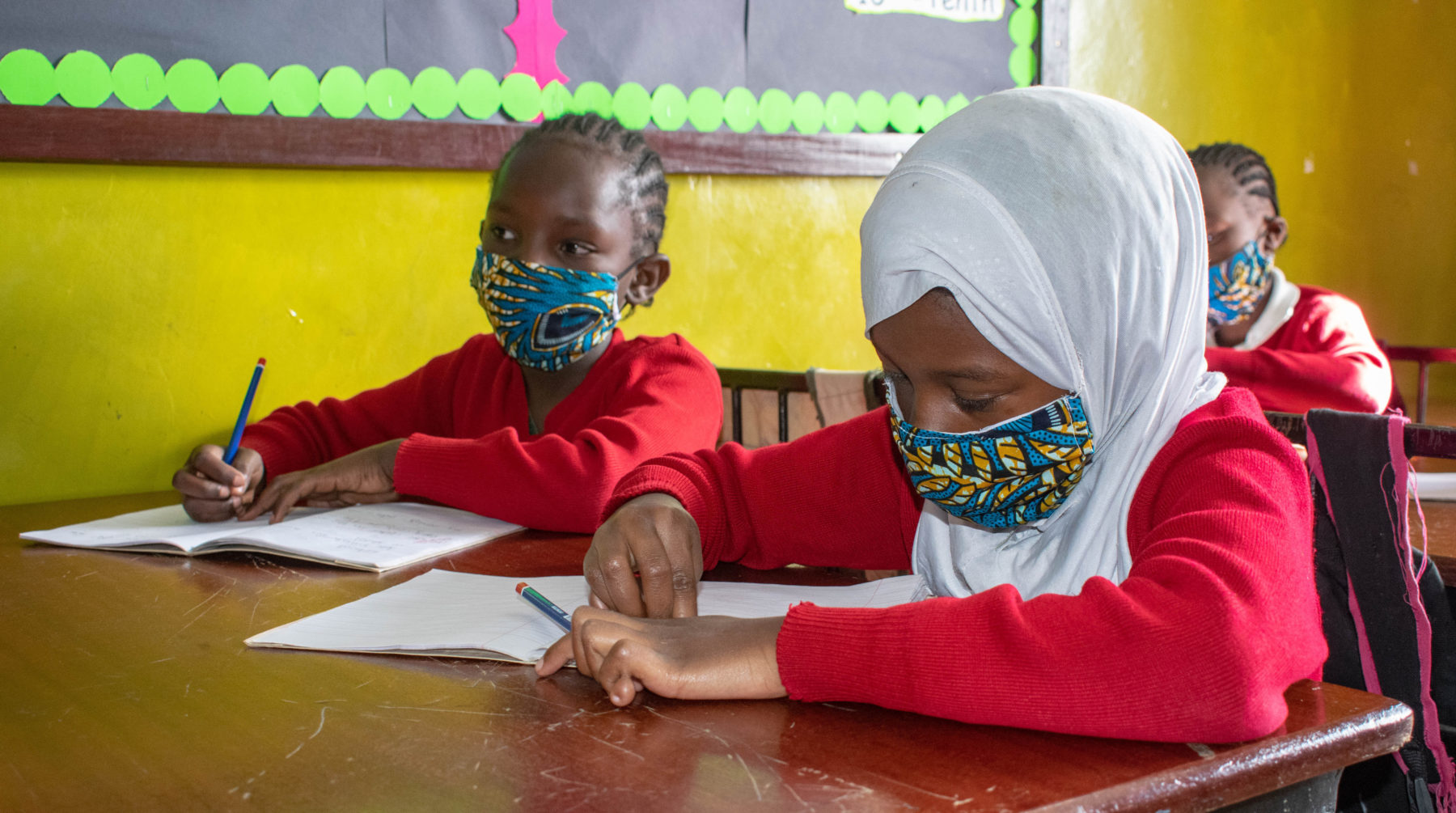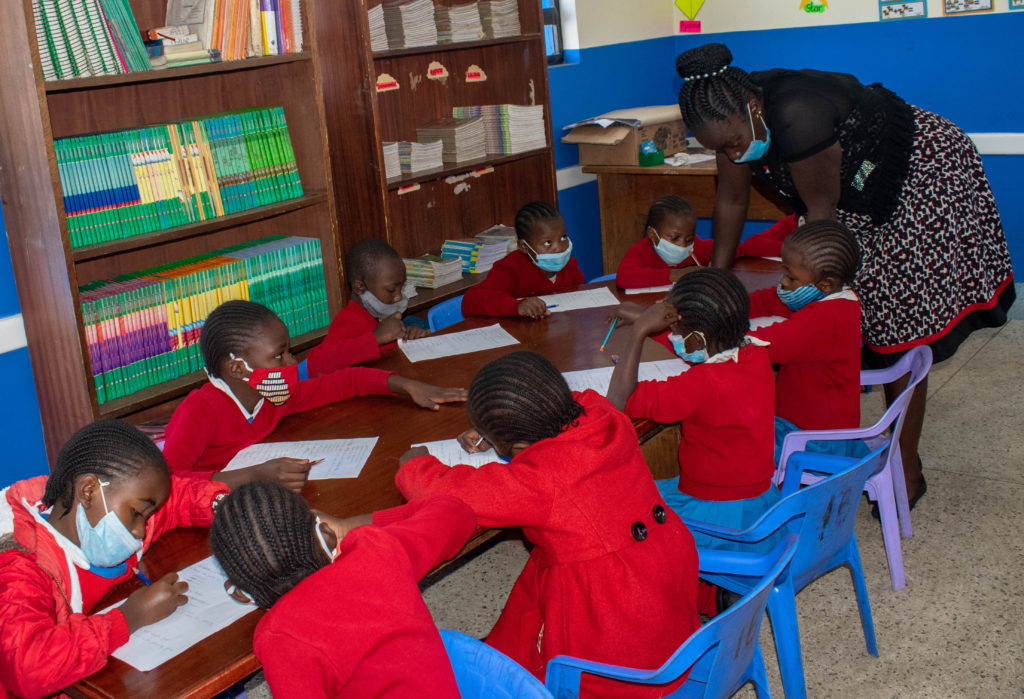
In a world far removed from zoom classes and online learning, SHOFCO’s teachers and care workers at the Kibera and Mathare Schools for Girls found new ways to educate and empower the next generation of female leaders.
When Covid-19 outbreak started in Kenya in March 2020, schools were closed and livelihoods were adversely impacted, yet our girls continued to learn. While many students across the world were able to continue their studies virtually, SHOFCO’s Kibera and Mathare Schools for Girls did not have this luxury.
Many saw their parents lose jobs, relocate to poorer living conditions and, in some cases, lose loved ones to the virus. With students nationwide out of school and often idle, there was an increase in gender-based violence cases, which in turn enforced a rise in diseases such as HIV/AIDS. Studies have shown that the vast majority of girls fear defilement and only 25% feel “safe” outside of their homes or schools.[1] For most of our students, school is the place where they feel safest.
Whilst these challenges have always been present in the slums, the Covid-19 pandemic exacerbated the already difficult situations that many of our girls experience on a daily basis. SHOFCO’s social workers and teachers had to adapt quickly to ensure the continued safety and academic nurturing of these girls.
One social worker at Kibera School for Girls, Phoebe Oloo, explained that she carried out support group discussions in order to inform the girls about Covid-19 as well as cultivate broader life skills. She also held family planning sessions, providing the girls with much needed sexual education and relationship building skills which helped them to safely navigate personal relationships.
Beyond these initiatives, SHOFCO’s social workers continuously had to find ways to monitor the living conditions of the girls at a social distance. In most cases, our staff stayed in touch over text message or cell phone. In the case of the most vulnerable, or those most difficult to reach, home visits were carried out to ensure the continued well-being of our students. The girls reported that this was a source of great comfort for them during this period of school closure.
“My teachers were sending homework to me. The social workers used to send messages to me using my mother’s phone and also called to ask how I was doing. They also called me to go and collect food from school accompanied by my mother. I once suffered from malaria during the pandemic but I was taken to hospital and I got well,” says Faith Achieng, a 10-year-old grade four student at the SHOFCO Mathare School for Girls.
Lilian Achieng, a social worker at Mathare School for Girls, described the challenge, remarking, “It [the Covid-19 pandemic] was a learning moment even for us, but we never lost touch with our girls.”
Homework proved an even bigger challenge, primarily due to the fact that our girls did not have access to sophisticated technology at home. Teachers designated specific times for students to safely pick up school work to complete at home. This continued throughout the period when the schools were closed, ensuring that our girl continued to learn.
Our students are among the most vulnerable in the slums and for many of their families, getting a meal during the pandemic was a challenge. As the front-line of support, our teachers were on the forefront in our school feeding program, an initiative that ensured these girls and their families had enough to eat.
Mercy Kasiti, the headteacher at Mathare School for Girls says: “Our teachers conducted home visits to check on students, reunite and learn more about their background to inform any future learning support. Following the suspension of classroom teaching, our teachers conducted community-based learning sessions in which they supported the students to nurture their talents and ability in various areas, including STEM, art, music, dance and gymnastics.”

The teachers also distributed homework via WhatsApp. With this, a new set of challenges arose. Many households only owned one phone and even fewer owned a smartphone. Oftentimes, that phone would be inaccessible to the girls as the parent who owned it would be out at work. Many girls explained that they had access to their homework in the dark of the evenings, when they were able to complete their tasks under candlelight in the best of times, or under any inkling of external light-sources that seeped indoors during the worst.
One smartphone-wielding mother in Mathare, Nancy Khasiala noticed this problem and sought to become a beacon of knowledge for girls who were in this situation. When teachers started sending homework to her through her smartphone, she shared the news with as many people as she could. The news of available homework spread quickly and eager-faced girls came from around the community to copy their homework from her, in a manner that was both safe and accessible.
Now that schools have been allowed to open their doors to students across Kenya, this, for SHOFCO’s girls, has been long awaited.
Faith Achieng adds, “I spent a lot of time out of school because school was closed. I missed school so much. I am very happy to be back to school to learn and be with my friends and teachers.”
Beyond academic learning, our girls develop strong bonds with their teachers and social workers who work to empower, inspire and educate them. As Sophie Aloice, a Grade 5 teacher at Mathare School for Girls highlights: “I am a role model to these girls; we open up and share together”. This sentiment is certainly felt by her students, many of whom named their teachers as the people they look up to the most. School, at the very least, is a safe environment where our girls have the space to learn and grow as every child should.
SHOFCO’s program integration enables the students to access various services. The education program works closely with the health program to ensure the girls access healthcare at SHOFCO clinic, and in instances where referrals are needed, SHOFCO clinic refers the girls to partner health facilities.
During the pandemic, the girls’ families also received emergency food support from SHOFCO. Some parents were also recruited into the SHOFCO Women Empowerment Program where they earned income for producing Personal Protective Equipment (PPE), such as gowns for use in SHOFCO clinics, and masks for use in the clinics and free distribution in the community. Other families also benefited from the cash transfer program.
Since the pandemic began, SHOFCO has screened 1,847,328 people for COVID symptoms at our clinics and household-level outreach and suspected cases are referred to the Ministry of Health for further testing. SHOFCO also had 50,848,549 uses of its 354 handwashing stations across 17 sites. We currently operate 40 handwashing stations, having transitioned 314 stations over to community management. SHOFCO has also distributed 28,048,786 litres of free water, and 408,510 soaps and 265,942 hand sanitizers to urban slum communities.
SHOFCO’s emergency food support program has seen 32,789 vulnerable reached with food distributions. SHOFCO has also partnered with GiveDirectly to provide direct cash transfers, with GiveDirectly disbursing $2,899,740 equivalent to 34,457 vulnerable families in the SHOFCO Urban Network (SUN).
In addition, the SHOFCO Gender department has responded to 2,064 cases of gender-based violence, with a 90% increase in average cases per month since COVID-19 began. To combat disinformation, SHOFCO’s rumour tracking tracking platform enables community members to report claims and rumors about the COVID outbreak via SMS. We have enrolled 351,054 contacts in our SMS platform, and analyzed 7,643 household-level survey responses.
Despite the difficult hiatus away from these centres of learning, ours girls are glad that the wait to return back to their classrooms is over.
[1] Annabel S. Erulkar and James K. Matheka, Adolescence in the Kibera Slums of Nairobi, Kenya, (2007, The Population Council).
